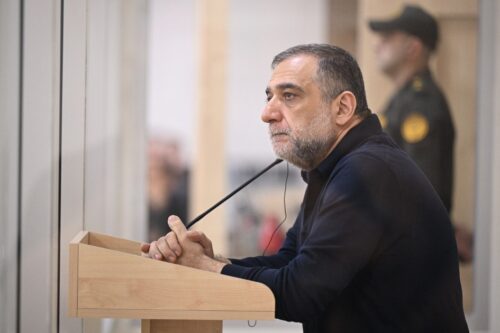
Davit Hakobyan: If Tumanyan’s “Anoush” was written in English, theaters would have long stopped to put on “Romeo and Juliet”
ABC interview’s guest was director, actor Davit Hakobyan. Davit Hakobyan’s concerns are mainly about Armenia and the situation around it. According to the actor, wars never end, and the seriousness of the current situation lies in the fact that our people have lost their code of self-defense and just want to live quietly.
– No one gets as much glory and love at the pinnacle of their career as an actor does. No one falls into oblivion a few hours after their moment of glory as an actor does. Who remembers Khoren Abrahamyan today?
– But there are films and plays that are reminiscent of him.
– When I ask my students questions, it turns out that they do not even watch those movies. It is not their rhythm; I make them watch those movies, as their profession demands it. Now, who remembers Vahram Papazyan, that genius?
– Which of Khoren Abrahamyan’s performances do you like the most, which one has impressed you the most?
– Fortunately, I have watched many of his performances. But I got the greatest pleasure from his performance as Coriolanus. I have watched Coriolanus several times. He was one of the greatest actors of his times. Khoren Abrahamyan was a world-class actor; he just didn’t play in Hollywood and couldn’t speak English. If, for example, “Anoush” by Hovhannes Tumanyan was written in English, theaters would have long stopped to put on “Romeo and Juliet”. They would have given “Anoush” instead, because “Romeo and Juliet” does not raise an acute problem, after all. Tumanyan’s “Anoush” is about human freedom, it’s about women’s emancipation; but when? In the late 19th and the early 20th century?
– I hear people saying that it is not us to blame for the current situation in the country, that nothing depends on us, it’s just that the geopolitical situation has changed, etc. Do you agree with this?
– I have been reading a lot of historical accounts recently. And I have understood that nothing has changed; the geopolitical situation has never been on our side. In the 16th century, the Seljuk Turks finally settled in this region, annihilating everything, even civilizations… Let’s be honest, when have we been stronger than the Turks? Let’s be honest, if we are not honest, we will not be able to find the way out.
– Once you said in an interview that the war broke out because of the lack of love. Is there enough love now to avert war?
– There is absolute truth: two countries are at war with each other; let’s say one wins and takes territories from the other country… The victorious people should not leave their country in that case. Do you know the levels of emigration in 1994? Ceasefire had already been declared. It was a massive emigration… In a few years, when the country began to claw its way back from the post-war reality, the first large-scale immigration took place. After that we have not seen any mass immigration. Isn’t this a lack of love? If you have liberated a country, why don’t you live in that country?
– Let us imagine that Armenia is standing at a crossroads and there are several paths to choose from. Which path should we take now?
– We should always take a right. Right means upright, straight. In Grabar (Old Armenian), right meant straight. In Grabar, they said, “Ask and it will be given to you.” It means, seek and it will be given to you… We do not even understand the Bible. We have not even become proper Christians. People tell me that we have become weak because we adopted Christianity, that Christ teaches us to be weak, that Christianity is a religion for the weak. Then I ask them: “Why haven’t the Germans, the French or Russians gone weak? Why have only we become weak?”
– And why have we gone weak?
– Because we do not understand what that religion says. And we have a contempt for those who spread it, but never for sectarians.
Interview by Lena Gevorgyan


